Success Stories - Stories from the Field
Here you may find a selection of stories from the field, reporting experiences of FFS participants, or facilitators, or FFS experts.
If you wish to contribute with a story, please send it to: [email protected], and it will be reviewed and possibly uploaded
"Many shared a negative vision of agriculture, but over time members of the FFS have been gradually conquered, agriculture is our new love and a hope for our life."
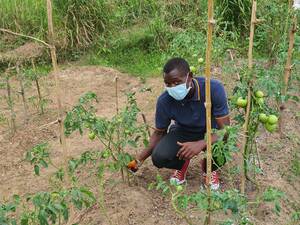
Patricio Francisco Mamiaga Avomo
Bata, Equatorial Guinea
Francisco Mamiaga Avomo is a 23-year-old Guinean young man, member of the farmer field school to improve the development of agricultural production in Equatorial Guinea in the city of Bata, funded by FAO and with the support of theMinistry of Agriculture, Livestock,Forests and Environment (MAGBOMA)
Mamiaga Avomo is an orphan of father and firstborn of 3 siblings of divorced parents. When his father died, he had to become independent and had to find ways to survive. When he came across the proposition to join the Farmer field school “AMOR”, he didn’t hesitate.
Mamiaga first joined the FFS in order to acquire skills and provide for him and his family. However, what started as a subsistence activity, quickly became for Mamiaga a passion.
From a young time Mamiaga wanted to study law. However, since he started studying and experimenting with the FFS group and knowing the value of the land, he has been in love with the work of the countryside. Francisco learned through experimenting and observations alternative practices that helped his production of vegetables. "Through this opportunity from FAO, particularly Don Walter, we have learned quite a few things. I had never worked with organic fertilizer Bocachi but now I can defend and share everything I have learned." In this way, the FFS offers a risk-free environment where you can discuss, deepen, modify and experiment with new ideas of agricultural management. "We produce vegetables such as tomato, cucumber, local aubergine, purple aubergine, pepper, watermelon, zucchini, parsley, onion and cabbage. We already have fixed buyers from the environment."
"I am very proud to work in agriculture, I am passionate about the land. I think a farmer should be a lover of the sun, the rain and everything that comes from the ground. I invite all young people to change their mindsets as agriculture comes to solve people's health and food. It is true that it requires a lot of physical effort, but after all there are good and great benefits." "The best thing for me is field work. If you don't have love for the countryside or the earth, you won't be able to work and consequently you won't be able to know the wonders that come with it. You must have passion and dedication. Put on challenges and through the day-to-day go after them."
"When I first heard of the opportunity to work and experiment in agriculture, I honestly had no hope, I thought it would be another failed illusion, but today I deeply thank FAO and the Government of Equatorial Guinea for this experience. We are young Equatorial Guineans and we need more opportunities like this."
For more information farmer field schools and youth click here
The agroecological grassroots movement revolutionising Indian farms
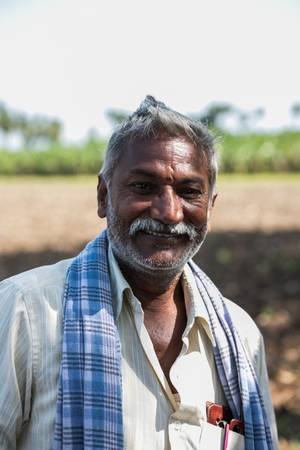
Kakani Sivannarayana
Andhra Pradesh Community Natural Farming (APCNF)
Kakani Sivannarayana used to only farm bananas on his plot of land. Prioritizing the most profitable crop was the only way he could afford the use of chemical fertilisers and pesticides.
Ironically, however, these expensive chemical products were harming the land and depleting the soil of nutrients and microbiological diversity, like useful bacteria and fungi. Over time, this makes the land less productive, meaning declining yields for Kakani.
When he heard about agroecological farming from neighbouring farmers, he believed that transitioning to a more natural farming system was worth a shot.
“Using seven to eight bags of fertilisers was expensive. Now that I use natural farming methods, they simply involve drava jiwamrut and ghana jiwamrut [two natural biostimulants prepared from locally available ingredients such as cow dung and urine, sugar cane, pulse flour and a handful of soil] which are very cheap. That’s why I am practicing natural farming: low costs and better income,” says Kakani.
“When we were using chemical fertilisers, our soils were compact like a cement road. The soils wouldn’t absorb water, and the expenses kept adding up. However, after adopting natural farming practices, the soils are softer, and the banana fruits are tastier. The produce stays fresh longer too,” says Kakani.
Natural farming not only reduced his costs but also increased his revenues and the health of his soils through inter-cropping, a method that involves growing several compatible crops on the same land. The aim is to use the plants’ natural synergies efficiently to improve the yield. For example, one crop may naturally provide nutrients to the soil that the other crop needs to grow or perhaps repel or trap pests affecting the other crop.
“With chemical farming, we could cultivate only a single crop. In natural farming, four or five intercrops are also cultivated, such as tomato, Brinjal, Chilli and pulses, providing additional income and nutrition.”
The success of agroecological farming on Kakani’s farm motivated him to encourage others in his village.
“I invited them to dig into my soils to find out how many earthworms there were compared to fields where chemical fertilizers are used,” Kakani says.
Earthworms thrive in healthy soils and in turn make the soil even healthier, increasing nutrient availability, encouraging better drainage and creating a more stable soil structure, all of which help improve farm productivity. Unsurprisingly, Kakani says, “We found that there were many more earthworms in natural farming fields.”
Natural methods for a better future
Kakani has since gained recognition for his success with the natural farming methods and was supported by FAO and the state government to become a trainer, setting up a Farmer Field School in his village to support other farmers in using the methods and learning for themselves. Now, Kakani also runs a Non-Pesticide Management shop, helping to supply local farmers with natural, locally-sourced pest and soil management solutions.
Many common agricultural practices used around the world today, such as mono-cropping or over reliance on chemicals, are not sustainable. They degrade soils, cause tremendous stress on water resources and affect the profits, health and livelihoods of farmers. Natural farming methods show that there is an alternative.
Thanks to Kakani and other pioneers like him spreading this natural solution, smallholder farmers spend less in input costs, get higher yields and more sustainable farming conditions, not to mention chemical-free food for consumers. Promoting the use of these simple, natural practices is paving the way for a more sustainable agricultural sector, changing our planet for the better.
For more information on Agroecology click here
Empowering women through Agropastoral Field Schools

Monica
Karamoja, Uganda
Monica lives with her extended family and three kids in Karamoja, a semi-arid sub-region in north-east Uganda, close to the border with Kenya. She joined her APFS group in 2012.
She is one of the three wives her husband married. All of them have their own field to cultivate, although the land is the property of their husband. “Everybody can decide quite independently what to do in their field, but we usually discuss with our husband what to grow.” Monica says that they were cultivating even prior to the APFS but with the knowledge and skills they gained, they decided to expand their activities. “We grow sunflowers, sesame seeds, groundnuts and cow peas. A part of what we produce is for home consumption, but the majority is sold. My income has increased, and I’m allowed to save money in the VSLS.” She also explains that the VSLS was an important change, as it opened up access to larger amounts of credit through proper savings, as well as through loans: “I even started my own small business,” she says.
Moreover, Monica explains that thanks to participating in the APFS group and the fact that she has improved her agricultural knowledge and skills, her success and improved economic situation have not gone unnoticed by other community members: “My neighbours have changed their attitude towards me. They used to underestimate my abilities and I wasn’t perceived as important at all. This has changed. They see that I’m able to make my own living, that I can save money and if needed, I’m able to cover medical expenses, and that I can make a commitment. They respect me now. For example, they come to ask me for advice, or how they can take part in the APFS,” says Monica, who seems very proud of herself.
In terms of household dynamics, she explains: “My relationship with my husband has always been quite fine. We haven’t experienced any serious problems, but what changed after the APFS is that I feel equal. I have my financial resources, and it’s me who decides what to do with them. This makes me feel that I am on the same level as my husband. Generally, I feel I have more control over my life. I can plan better, and I rely on my own work and things I produce. I’ve also decided to have more kids, but only when the three I already have have grown up a bit more. So I’ve started planning when to get pregnant. It gives me more control.”
For more information on gender and social inclusion click here
An amazing story of an amazing lady
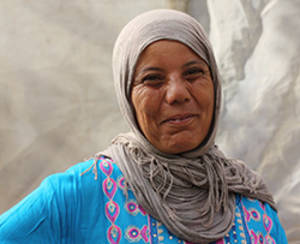
Chedlia
Tunisia, Monastir, Cherahil
Chedlia is an amazing smiley and strong lady with a deep look and life experience written in her face. She lives together with her family composed by her two little daughters, sister, and their old mum in Cherahil in Monastir Gouvernorate, little less than 300 km from the capital Tunis. Chedlia’s husband left time ago the country and they don’t have much contact, so nowadays it’s Chedlia and her sister to take care of everything.
Their farm is bit isolated, without many contacts with other neighbours, so when the proposal to join the FFS group came for the first time in 2012, she refused. I was something new, she never heard to talk about before. However she remained curious about the initiative and when she had the possibility to see the results from the first FFS cycle, she and her sister Nejiha decided to join the next year round. And just in that moment the change started.
Their income comes exclusively from agriculture, cultivation and partially processing. Currently they are growing mainly tomatoes, chilli pepper, eggplant, potatoes, leafy vegetables, carrots and some other vegetables for home consumption. They also have some olive trees. Actually it was eggplant that made a big difference; it wasn’t typical at all in this area and Chedlia decided to take the risk and to start growing. Now she has four greenhouses and occasionally employs other two or three women.
Chedlia is actively using IPM in her farm. She practices alternative methods to control pests and she is happy because the use of pesticides lowered by half and thus the expense related to this.
Family means of transport is a donkey-drawn cart. Chedlia managed to establish regular collaboration with a local purchaser who is coming to her farm to buy produce.The farm expenses lowered and the yield increased. With the higher income they decided to start small sheep farming, to increase the number of poultry and to enlarge their house.
The experience and function of FFS goes much further than agricultural activity: “This year there is no FFS and we miss it so much. It became a habit, a nice routine, a regular contact with others.”
Chedlia became an inspiration for other women in the area, because of her knowledge and courage. She is actively encouraging them.
For more information on gender and social inclusion click here
Farmer Field Schools for climate change adaptation
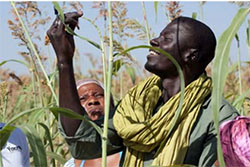
Mali
Launched in 2012, the project Integrating Climate Resilience into the Agricultural Sector for Food Security in Rural Areas is based on 15 years’ experience by the Integrated Production and Pest Management (IPPM) regional programme in working with Farmer Field Schools; (FFS) and sustainable agriculture. The project addresses climate, environmental, social and economic issues linked to global warming by integrating Climate Change Adaptation (CCA) topics, strategies and tools in two areas: strengthening farmers’ capacities through FFS and advocacy at institutional level, especially to support greater attention to climate change.
The Farmer Field Schools are a community education approach based on experience (learning by doing) and cooperation. Their weekly training sessions offer groups of 20-25 producers – men and women – from the same village the chance to test innovations in a safe environment and develop their capacities for Climate Change Adaptation (CCA) during a farming season. The training is conducted by a facilitator who personally took the same course for a season and acquired a good understanding of the principles of informal education, as well as of existing CCA practices. The FFS is therefore a platform for farmer learning, enabling producers to adapt existing CCA practices to their needs and circumstances, based on research, dissemination and traditional technologies.
After three years of implementation the results speak volumes: upscaling of the; CCA/FFS approach in 134 municipalities as a result of full commitment from local and national authorities; adoption of improved seeds in 242 villages; dissemination of 13 improved/adapted varieties; creation of 4 agroforestry zones and barriers made from trees and shrubs (managed by producer organizations comprising 75 per cent women); capacity strengthening for around 16 000 producers, of which more than 5 000 are women; publication of a training guide for facilitators on CCA practices for Farmer Field Schools; inclusion of CCA in national policies and the creation of a national climate fund to support key development stakeholders.
The way of independence and recognition
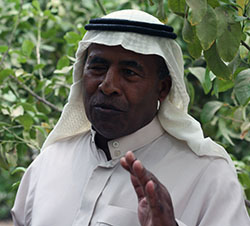
Hasan
Jordan, Karak, South Ghor, Safi
Hasan lives together with his family in South Ghor, southward of the Dead Sea in Karak Governorate, not far away from the potash production site. He shared with us his great story starting back in 2005 when he joined the FFS group organized in collaboration of the FAO regional IPM programme and the Ghor al Safi agriculture directorate.
He used to cultivate on 3 ha and at the same time he used to work for a big farm as a supervisor of a group of workers. “Through the work and experience done in FFS we became more independent, more self-confident. Now we are able to make the right, reasoned decision without relying on others.” The second year Hasan’s wife, son and niece joint the FFS group too. After that they decided to rent another 3 ha of land. “First, we felt we can manage it, that we have enough knowledge and skills. Second, we had enough financial resources to do it.” Currently they are growing mainly tomato, eggplant, pumpkin, pepper, broccoli, cabbage and some other vegetables for home consumption. IPM caused better quality of produce and lower expenses. Higher revenues allowed the family to invest in some apartments in the city.
“Communication with my family improved so much. In FFS we learnt how to listen the other person. I’m now using dialog, discussion to solve everything.”
Another thing that changed in the community thanks to FFS experience “is the way of thinking and communicating with others. We listen the other’s opinion, we respect it. Before we were not really listening.”
There are other non-FFS farmers coming to ask for advice. “People trust me a lot. Through FFS I became recognized by my community. I often represent the community, I communicate with authorities. This allows me to transfer the message from people, farmers to the ministries. I asked for more FFS in our area. I said, this is what we need here.” Hasan is now the member of the local district community [1].
He was elected between 2007 and 2009 the chairman of the local association “Ghor Safi Agriculture Cooperative“. We found resources through which we were able to initiate a revolving microcredit fund for small farmers. Twenty farmers benefitted from this programme.
As a first small-scale farmer, he has been awarded by the potash company as a “good farmer”. Before that only large-scale farmers used to be the winners.
Hasan used many times during the interview expressions as recognition and independence and finally he added “My family is proud of me.”
For more information on Integrated Pest Management click here
[1] Local district community is a group of active people, representatives of the local community. They are identified and selected by the governor together with the local community to represent it in meetings of the administration where problems and its solutions are discussed together. These representatives are usually appreciated and recognized by the community for their wisdom and credibility. Local district community groups consist of on average 10 members.
Liberating and developing own potential
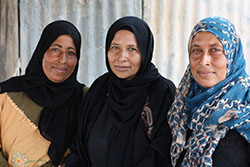
Asma
Jordan, Karak, South Ghor, Safi
Asma’s home is Safi, southward of the Dead Sea in Karak Governorate where she lives together with her family.
Asma was 24 when in 2007 she was proposed, together with her brother, to join the FFS group on tomatoes production in this area. She was one of the two women in that FFS group. Her skills improved rapidly as well as Asma’s capacity to express clearly her opinion and to communicate openly with other group members that were mostly men. “My voice changed, I started speaking more loudly and with more confidence”.
Nayel, the FFS facilitator and today the Head of Project department from the local extension office explained why he contacted Asma: “I know local people; I have been working here for ages. Asma was extremely shy but she was working very hard. I realized that she needs support to liberate her potential. The situation was facilitated by the presence of her brother in the same FFS group.”
Later on, in the third year of the participation in FFS, Asma became an FFS facilitator for a group of women. At that point her sisters, Zeinab and Wisal, also joined. Even today, when there is no active FFS programme, the FFS ex-group of women is still meeting to discuss technical problems they are facing in their agricultural activities and to share information. One of the women from of the Asma’s group said: “Everybody used to work on his/her own. The FFS changed us a lot, we strengthened our relations and we work very often together nowadays. We trust each other.” This ex-FFS women group is practicing the rotation saving system, in Jordan called “jameiyah”, which is usually used for the purpose of educating the members’ kids.
Asma started working on the family farm at her 17’s. Nowadays it is she, together with her elderly father, to be the principal managers and decision makers. Her big sisters Zeinab and Wisal are the co-workers and co-managers, “everybody has his or her own important role”. Their family is able to do all farm work by themselves so they hire 4-5 seasonal workers (neighbours) only in specific moments of the year, especially during the harvest.
They used to grow basically only tomatoes for the commercial purpose. After their FFS experience they introduced a new variety of tomatoes (through the FFS programme) and new crops as okra, bean, squash, broccoli, or cauliflower. They produce for local market and home consumption using actively IPM approach. The quantity of pesticides used lowered by more than half. Among technical skills, knowledge, tools they learnt in FFS they see as most significant the observation, soil solarisation, and use of pest traps.
When we asked Asma what she perceives as the most positive effect of her FFS experience, she said: “I have much more self-confidence and self-esteem. My knowledge improved, we regularly share information with other farmers, we discuss. And my family respects me.” The women in her group said: “Even if men are still more critical towards women than towards other men, we are now recognized by them much more because of our knowledge and capacities in the field work. So basically we now decide what we do.”
“My neighbours contact me whenever they have a problem in their field, and I am able to give them an advice.” There are other seven women farmers that started their agricultural activity with Asma’s help, she became an example for them.
The family income increased significantly thanks to lower production expenses and higher income. They are also able to sell their produce at 5-10% higher price because of the IPM quality. This allowed them to do many things that were impossible before, “we didn’t have remaining resources available before starting practicing FFS knowledge”. “Now we are sending two of our kids and our youngest sister to university and we could also afford to travel three times to Mecca for pilgrimage (Omra)”, said Asma smiling and with her wide-open eyes.
Asma told us that when there is a conflict in the community (usually because of water), they act as a group and become mediators between the two parts. They are able to play this role, because of the respect from the community they gained through the regular FFS work.
And Nayel is adding: “Asma is another person today. She became strong and self-confident, able to express and to defend her opinion. She is guiding and inspiring other people now.”
The Asma’s group has been initiated under the region programme Regional Integrated Pest Management Programme in the Near East (GTFS/REM/070/ITA).
For more information on gender and social inclusion click here

